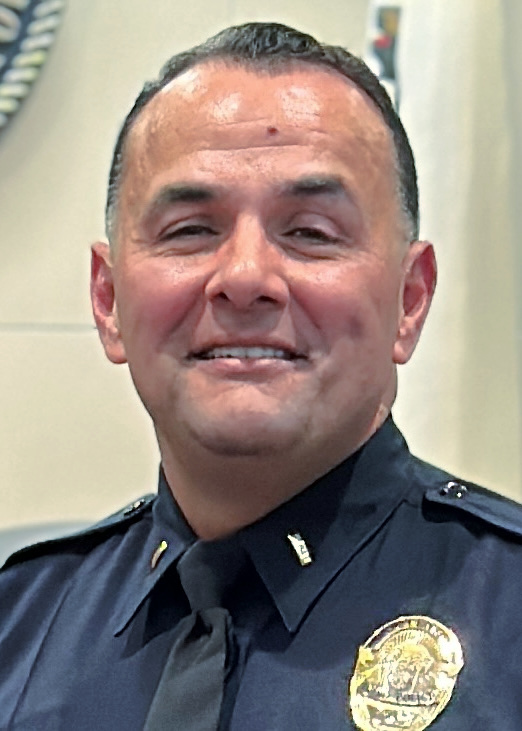With over 20 years of law enforcement experience, I have a deep-seated commitment to public service, inspired by my family’s long tradition of serving the community. My journey began with four years of active duty in the Army and three years in the Army Reserve. I’ve had the privilege of serving in two law enforcement agencies across the Inland Empire and am now a proud member of the Indio Police Department in the Coachella Valley.
Throughout my career, I’ve focused predominantly on traffic-related assignments, working as an accident investigator and motor officer. However, my true passion lies in teaching. I’ve spent much of my career as an FTO and trainer, driven by a lifelong love of learning and sharing knowledge. I’ve also contributed as a subject matter expert with POST, specializing in field training programs and report writing.
What motivated you to be a LEPSL ambassador?
One of the many reasons I wanted to be an ambassador is because of how impactful the LEPSL program has been for me. As someone who enjoys mentoring others, I’ve found the discussion boards to be a valuable opportunity to explore contemporary topics and gather insights from various levels of law enforcement. These discussions often serve as a springboard for meaningful conversations beyond the board, enriching both my own understanding and my ability to guide others.
Why did you choose the LEPSL program? What made LEPSL stand out in comparison to other schools/programs?
I chose the LEPSL program based on recommendations from SLI classmates who spoke highly of it. After researching the program, I found that its format and coursework offered a way to make reasonable yet manageable improvements in my professional and personal life. I also appreciated that the LEPSL program provided course credit for SLI, which was a great benefit given the rising costs of education—every bit helps.
What were your concerns about starting a graduate program?
One of my concerns was the level and length of engagement in a program. What stood out to me about the LEPSL program was its balance of engaging content and manageable class lengths. Like many police officers, I can get quickly bored and prefer learning in digestible segments. The LEPSL program allowed me to engage thoughtfully with students and revisit concepts without losing interest. I appreciated this structure because a longer course format might have led to disengagement for me.
How did the LEPSL program help you achieve your career goals?
The most apparent benefit for me was that the LEPSL program enhanced my marketability as a police lieutenant for other agencies. It challenged me and introduced me to the language of management, shifting from discussing AOIs and PCFs to topics like line-item budgeting and resiliency training. While I will always be a street cop at heart, the LEPSL program provided me with a new vocabulary that has improved my communication with both officers on the ground and management.
What advice would you share with prospective LEPSL applicants?
If you’re considering the LEPSL program, I highly recommend it. It’s a significant step forward, both professionally and personally. The program’s exchange of information and ideas is incredibly relevant to advancing your career. It provides valuable insights and practical tools to enhance your interactions with management and city leaders. By participating in LEPSL, you’ll better understand law enforcement management, improve your communication skills, and become better equipped to make informed decisions. This program will genuinely contribute to your growth as a leader in the field.
What was your favorite part of the LEPSL program?
My favorite part of the LEPSL program has been the readings and the discussion boards. I appreciated the diverse range of resources from which the articles were selected, offering various perspectives and insights. Engaging with these readings on the discussion boards exposed me to viewpoints and ideas I hadn’t previously considered. This exchange of perspectives broadened my understanding and enriched my approach to complex issues in law enforcement.
What were you balancing while participating in the LEPSL program?
When I decided to start the LEPSL program, I was serving as a supervisor in field operations. Midway through the program, I applied for and was hired by the Indio Police Department. Despite the challenges and uncertainties of transitioning to a new role, I remained committed to completing my coursework. I balanced my studies with immersing myself in my new department, ensuring that I stayed engaged in my academic pursuits and professional responsibilities. This experience taught me valuable adaptability and time management lessons, reinforcing the importance of continuing professional development even during times of change.
How did you stay motivated throughout the program in the face of competing priorities in your life?
I realized that the 20 months of personal and professional adjustments were a small price to pay for achieving something so significant. My motivation was also deeply personal: I am a first-generation American from Mexican parents to earn a master’s degree. I can still hear my mom’s encouraging voice, saying, “Estudia!” (study). Her support and my desire to honor our family’s aspirations fueled my commitment to the program.
LEPSL Graduating Class:
2024
